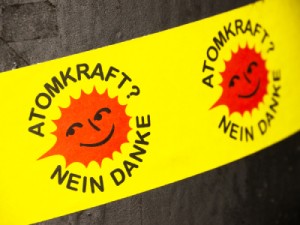Germany, which has never had a nuclear accident on the magnitude of a Chernobyl or Three Mile Island, plans to phase out nuclear power by 2022. At the same time in Japan, which is still trying to control one of history’s worst nuclear accidents, there is no serious opposition to nuclear power. The New York Times reports that a plan for expanding Japan’s nuclear industry, shelved as the crisis with the Fukushima reactors continues, will very likely be revived in the future because of the local economic benefits a nuclear plant offers.
 The contrast between Germany and Japan’s nuclear attitudes invokes two recurring story lines in the larger environmental debate. The first is the inherent contradiction of nuclear power, and the second is growing faith in renewables.
The contrast between Germany and Japan’s nuclear attitudes invokes two recurring story lines in the larger environmental debate. The first is the inherent contradiction of nuclear power, and the second is growing faith in renewables.
Nuclear energy has always been a problem for us non-doctrinaire environmental types – environmental practicality and environmental disaster rolled into one. Go looking for opinions on what’s more environmentally sound, nuclear or fossil fuels, and you’re going to strike an emotionally charged mother lode. Some point to the respective death rates attributed to fossil versus nuclear. Some highlight the pollutants and greenhouse gasses fossil fuel plants emit. Others say it’s a false choice between two unacceptable solutions that draws attention from renewable energy development.
If you look at it from a day-in, day-out perspective, it’s hard to argue against nuclear. A nuclear plant does not emit pollutants during normal operation the way fossil-fuel-powered facilities do. Uranium enrichment is less environmentally damaging than coal mining, and much safer. Nuke plants operate for years on a complement of fuel rods. Fossil fuel plants need coal and oil shipped in constantly by rail or ship, which expends fuel and emits pollutants.
As Fukushima has demonstrated, though, when you go nuclear you’re entering a high-stakes game. Nuclear waste is arguably the most toxic material that humans produce, and it stays toxic for thousands of years. Nuclear accidents like Chernobyl and Kashima have huge social and economic costs. Five million people live in regions still contaminated with radionuclides from Chernobyl. The then-Soviet government of Russia had to move 350,000 people a safe distance from the ruined reactor. The town is deserted. The surrounding exclusion zone, where no residences or businesses are allowed, covers almost 300 square miles once occupied by 120,000 people. The reactor itself is still a danger. Nuclear experts are concerned that its concrete enclosure is decaying enough to raise the risk of radioactive dust.
Even when a nuclear accident occurs, it doesn’t take the familiar refrain of “if not nuclear, what?” to appear. I didn’t have an answer myself until this week. Germany provided it: renewables. Germany’s plan to get out of the nuke business does not include falling back on fossil-fuel-generated power. It’s based on the country’s long-term plan to go heavily into renewables.
This is Germany we’re talking about. Eighy-five million people. Europe’s largest economy. Source of some of the world’s finest science and engineering. Not a country or a people prone to irrational decisions made in the heat of passion. About 70 percent of Germans expect electrical rates to rise as nuclear is phased out, and they’re willing to pay the price. If they believe renewables can support a heavily industrialized economy, I’m sold. Germany is setting a goal that the rest of the world should aim for as well. Every major technological development in history looked crazy at one time. (A week’s worth of music on a credit card, anyone? How about guiding a rover around Mars from Earth like it was a radio-controlled car?) With the pace of renewable energy technology development, Germany’s goal looks less crazy than it does savvy.